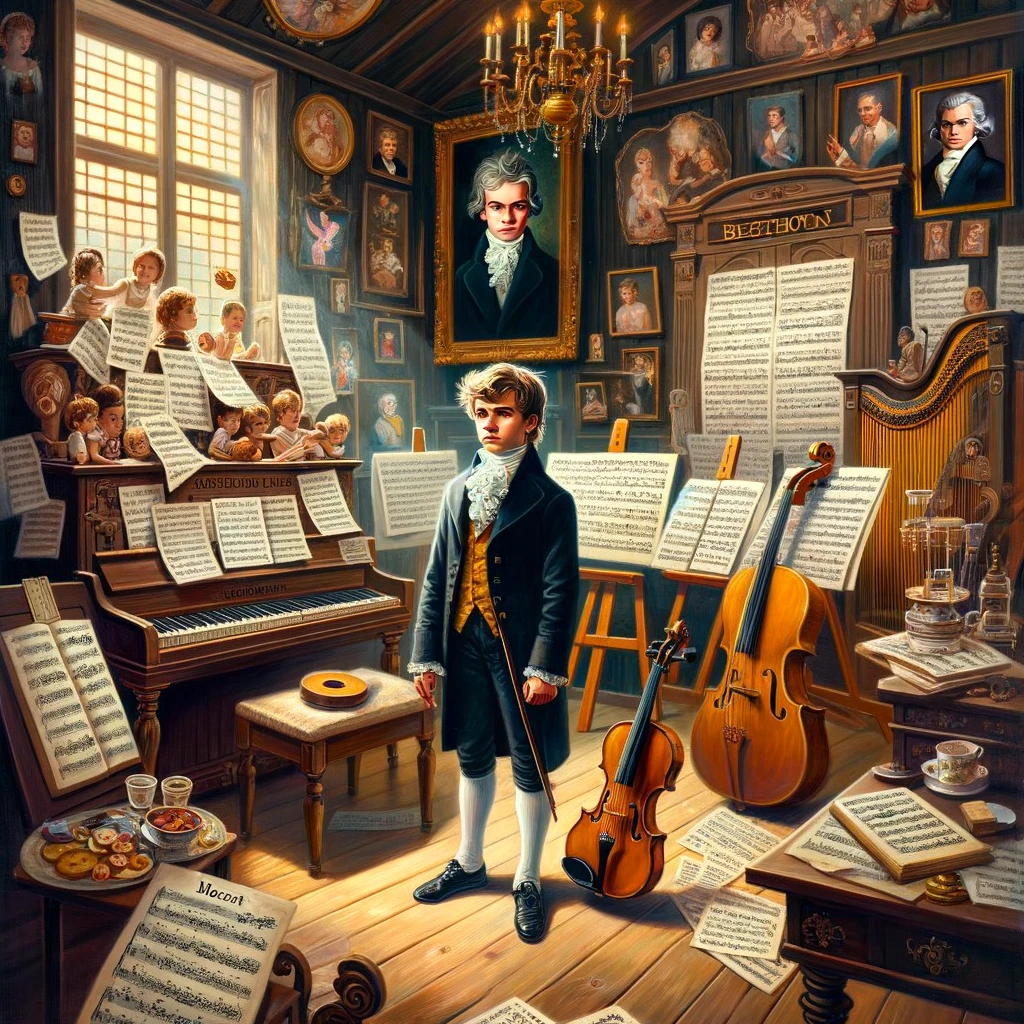Ludwig van Beethoven is a name that resonates strongly among music experts worldwide. His symphonies, sonatas, and concertos, which have set the ‘gold standard’ for all classical music, resonate in every field. But there is still so much more to this musical mastermind than the compositions celebrated around the world, the untold history of pains, battles, and commitments to art. Here, we look into Beethoven’s life, not just his superlative musical contributions, but also the man of music.
Early Life: The Humble Beginning
Ludwig van Beethoven was born on December 17, 1770, in Bonn, Germany, to a musician family. His father, Johann van Beethoven, was an usher for the court singer, and he vowed that his son would be as brilliant in music as Mozart was. Johann pushed his son hard, rousing him to practice the piano at night, sometimes as late as 1:00 AM. During such strenuous and sometimes brutal instruction, it was patently obvious that the boy had a gift that even the cruelest practices could not eradicate. Beethoven was playing well enough by the time he was seven to be performing in public, and at 12, he was writing his own compositions.
Beethoven did not actually have an effortless life at all. Beethoven’s father struggled with alcoholism, leading to significant financial difficulties for the family. At 16 years of age, his beloved mother died, and he had to take care of his two young siblings. These hardships gave Beethoven an outlook on life that bearded difficulties and provided him the sense of resolve he would later exercise on the hardships that lay ahead for him.
Vienna and Beyond: The Turning Point in a Career
At the age of just 21, Beethoven moved to Vienna in 1792. Vienna was, at the time, a city not only known for lively music, but also all abuzz with itself. He would later comment that this marked the turning point in his career. Some of the greatest composers who lived while he still breathed. Beethoven quickly established himself as a brilliant pianist, showcasing a bold, expressive, and brilliant style filled with full energy. Haydn dominated most of Beethoven’s early compositions; gradually, however, he began to shape his own voice, eventually departing from the conventions of classical music structures.
It was during his sojourn in Vienna that Beethoven composed some of his well-known early works, including his “Piano Sonata No. 8” (commonly known as the Pathétique) and his “Symphony No. 1.” His innovations included intensive emotionality and dramatic contrasts, which were unprecedented in all that listeners had heard so far.

The Onset of Deafness: A life-changing struggle
The most pathetic aspect of Beethoven’s life is hearing loss. In his late 20s, Beethoven started to notice a ringing sound in his ears, a condition known as tinnitus. That marked the beginning of a gradual deafness that persisted for many years. Beethoven became nearly entirely deaf by the age of 44 years.
It would have been disastrous for a composer to lose his hearing ability; certainly, it was absolutely devastating for Beethoven. The more isolated he became, the more he avoided social gatherings, as he simply could not hear conversations. He even considered suicide at one time, as observed in his famous “Heiligenstadt Testament,” a letter he penned to his brothers in 1802. On that letter, Beethoven complained about his hearing loss but eventually made peace with himself to compose for as long as he could.
The Middle Period: Triumphant Over Adversity
He was deaf, yet Beethoven entered his “Middle Period,” where most of the creativity and innovation occurred. Among his most famous works are symphonies composed in this period: “Symphony No. 3” (Eroica), “Fifth Symphony,” and “Violin Concerto.”
Notably, the Eroica Symphony was the work that heralded Beethoven’s sharp turn in his career. Beethoven dedicated it to Napoleon Bonaparte, whom he admired for his revolutionary ideals, but later renounced the dedication upon learning about Napoleon’s authoritarian rule. Beethoven extended the genre possibilities of a symphony with the Eroica, a groundbreaking work in scale and complexity.
It is probably his most celebrated work, with the famous four-note motive (“da-da-da”). Such a symphony, symbolic of victory over defeat, was very intrinsic to Beethoven’s existence, and this musical piece depicts it as a struggle followed by victory, while symbolising the battles Beethoven fought with his deafness and personal demons throughout his life.
The Late Period: The Master’s Final Years
At the same time, it has increasingly become a period of his creation of some of the most magnificent works: deep, perceptive, extremely emotional works, as well as works of great spiritual quality that can be classified under the term “late period.”
The most significant compositions from this period are part of his “Ninth Symphony,” finished in 1824. This piece is quite exceptional because it has a choral part in the fourth movement of the symphony, using that “Ode to Joy” melody. The Ninth Symphony became one of the most robust statements by human beings on humankind, brotherhood, and peace, becoming nowadays an anthem for unity and freedom throughout the world.
The Ninth Symphony is so outstanding because Beethoven composed it when he was completely deaf. During the premiere of the work, Beethoven was unable to hear the orchestra or the audience’s applause. One of the musicians reportedly had to turn Beethoven towards the audience to witness their standing ovation.
Legacy: A lasting impact on music and culture
On March 26, 1827, he died at the age of 56. More than 20,000 people attended the funeral, paying tribute to the genius of the man who brought music into the world. Beethoven’s influence extends beyond composition to the transformation of music itself. Beethoven unveiled previously unexplored depth, emotional intensity, and personal expression in classical music.
The works of Brahms, Wagner, Mahler, and many other musicians demonstrate his influence. His music continues to inspire filmmakers and commercial composers. Beethoven’s music says a lot, yet says nothing.
Conclusion: The Man Behind the Music
Ludwig van Beethoven’s life was a constant battle, but with fantastic creativity and brilliance. Despite being a sufferer of total hearing loss, Beethoven never stopped composing music. Beethoven’s testimony reveals an untamable spirit and passion for life, deeply entwined with the human experience. Today, Beethoven is one of the most famous and influential composers in all the annals of history, and his creativity never stops inspiring and moving people on this earth.

As Beethoven himself said, “Music is the mediator between the spiritual and the sensual life.” So, through music, Beethoven has closed the gap between these two entities and created masterpieces that begin to speak to the soul.

